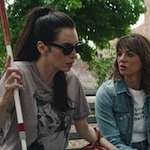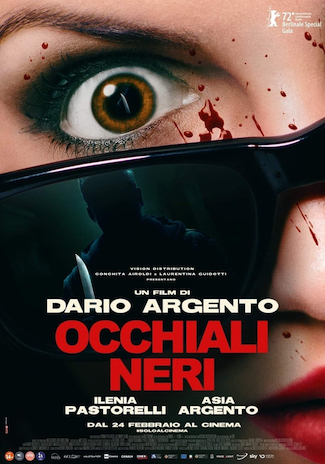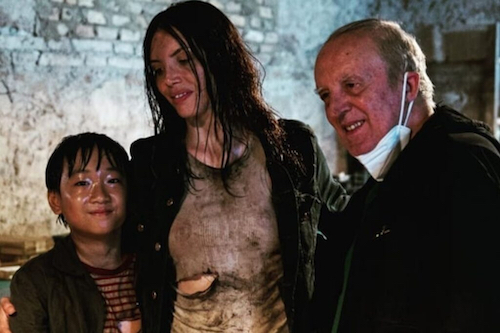 Every once in a while the streaming service Shudder does a “secret screening” – a one time only showing on their live feed of a movie they’re not gonna have available until later. I think this is a really cool idea, and something they can do specifically because they’re one of the more lovingly put together services, run by actual programmers trying to curate horror movies they think their subscribers will be excited about.
Every once in a while the streaming service Shudder does a “secret screening” – a one time only showing on their live feed of a movie they’re not gonna have available until later. I think this is a really cool idea, and something they can do specifically because they’re one of the more lovingly put together services, run by actual programmers trying to curate horror movies they think their subscribers will be excited about.
I caught what I believe was the first time they did it, when it was a time loop thriller called LUCKY. I was into it but something about the ending that I don’t remember anymore fell flat with me and I never actually reviewed it. (Others thought more highly of it.) But I happened to be free last Saturday when I saw they were doing another one, so I gave it a shot again.
When the credits started in Italian I admit that my limited horror brain did immediately think “Is this an Dario Argento movie?” But I didn’t specifically remember he had a new one called DARK GLASSES (Occhiali neri) until his credit and the title came on after the ominous opening scene. If there’s a giveaway, it’s the swaggeringly aggressive use of electronic score by Arnaud Rebotini (a French musician from a band called Black Strobe). It sounds John Carpentery at first, then a little Gobliny, and by the end you’re at some evil rave.
(theme music spoiler)
(end of theme music spoiler)
This was the Argento movie that was prematurely announced as having Daft Punk signed on for the score. They were actually in the process of breaking up, so it didn’t happen. Oh man, I bet that would’ve been great. But I really like Rebotini’s score. Sorry he has to live in that shadow.
DARK GLASSES is the first new Argento movie since DRACULA 3D ten years ago, and admittedly the first I’ve actually watched since 2007’s MOTHER OF TEARS. I don’t think of him as a current filmmaker, but here he is adding to this year’s unusually strong crop of spook-a-jams. I don’t want to set expectations high by calling it a return to form. When I told a friend I saw it he asked, “Does it look like his movies?” and I realized that if someone wanted the colors or meticulous staging and set pieces of a SUSPIRIA or a BIRD WITH THE CRYSTAL PLUMAGE or an OPERA they would be disappointed. It’s much simpler than that. But it’s a compelling protagonist in a blistering stalk-and-chase with an effectively creepy psycho, it follows pleasing giallo tropes without feeling beholden to them (for example, it doesn’t expend much energy hiding the identity of the killer), it has an angle to it that feels genuinely fresh, and it does it all briskly, getting out of there in 80 minutes. Just what I needed.
 It begins mysteriously, hauntingly, with a scene that establishes the tenor (and title) without as far as I can tell being narratively connected. The camera (cinematographer: Matteo Cocco) floats eerily through tree-lined streets before revealing that it’s the POV of a striking looking woman driving around. She sees people looking up to the sky, holding plastic strips to view an eclipse. It seems like maybe she had no idea this was going on, but she stops at a park, tries to watch, at first unprotected, then with… you know, the titular eyeware. She hears a couple telling their daughter about eclipses, how people used to think they meant the world was ending.
It begins mysteriously, hauntingly, with a scene that establishes the tenor (and title) without as far as I can tell being narratively connected. The camera (cinematographer: Matteo Cocco) floats eerily through tree-lined streets before revealing that it’s the POV of a striking looking woman driving around. She sees people looking up to the sky, holding plastic strips to view an eclipse. It seems like maybe she had no idea this was going on, but she stops at a park, tries to watch, at first unprotected, then with… you know, the titular eyeware. She hears a couple telling their daughter about eclipses, how people used to think they meant the world was ending.
This is not gonna be a movie about the end of the world or a zombie plague. It’s just about a serial killer, and I don’t think it’s telling us the eclipse sent this man on his killing spree. The scene reminds me of the fixation on the sun and the Zodiac early in THE TEXAS CHAIN SAW MASSACRE. Not an explanation, just a mood-setter, and a reminder that these relatively intimate events of brutality between a few people are situated inside a solar system within a universe we will never fully comprehend.
Okay. Let’s go. A film by Dario Argento. Next we meet a high priced call girl (Viktorie Ignoto) leaving a hotel. The staff all know her by name and are nice to her, offer to get her a cab, but she declines. I’m not sure it would’ve made a difference – on the street right outside someone comes out from some shrubs and garrots her. The traditional Argento greeting of an early, gory murder. A crowd of horrified pedestrians and bellhops watch this poor woman gurgle and die on the sidewalk. Nobody can help her. But someone tells the cops they saw a van speeding away.
Our celestial-event-viewer from the opening scene is Diana (Ilenia Pastorelli, THEY CALL ME JEEG), who is also an escort. She has a rich old man clientele and seems to get along well with many of them, though we see two very bad encounters offering us a couple murder suspects. They come so fast I wasn’t sure if Argento and co-writer Franco Ferrini (ONCE UPON A TIME IN AMERICA, PHENOMENA) were leaning a little too hard on a red herring or being surprisingly direct about who to keep an eye on. I’ll leave it for you to find out for yourself. One john tries to assault her so she pepper sprays him, kicks him in the dick, and pepper sprays him again. She’s not Beatrix Kiddo or anything but she’s a fighter.
As Diana leaves in a rush, a guy approaches her car window. We don’t see his face at all. As she tears away he runs to his van and pursues her. But this is so early in the movie, and I’m not fool, so I knew it was a fake out. She dropped her wallet and he’s trying to give it to her, obviously. And then her and us together exhale and catch our breath and get back into the set up before the shit hits the fan. That’s what I thought. Nope – the van rams into her car, knocks it through another car, rolls her. Horrified onlookers run over to the other car and find a 7-year-old kid sitting in the back seat, in a daze. His parents aren’t as lucky.
When Diana wakes up in the hospital she learns that her corneas were damaged and it’s unlikely she’ll ever see again. So that’s what this is. The movie picks up with Diana trying to adjust to her new life. A woman from an agency for the blind, Rita (who I somehow didn’t recognize as Asia Argento, LAND OF THE DEAD), teaches her some of the tricks, takes her walking with her new white cane, gets her an accessible phone, brings her to get a dog, Nerea. Rita seems cool and Diana seems like a quick learner. The client who gushed about her being a strong independent woman earlier wasn’t wrong.
A subtle thing I respect about the movie is that there’s no hint of judgment toward the sex worker characters. I’m not saying that the exploitation movies of the ‘70s and ‘80s side with their misogynistic killers necessarily, but they tend to play up the seediness and the idea that being in such a profession is playing with fire. DARK GLASSES seems to me to take on Diana’s attitude – this is my job, it’s none of your fuckin business what I do, if you think it is then you are cordially invited to fuck off to your rightful homeland, the Kingdom of Stupid Assholes.
(Also there’s a Chinese protagonist who gets bullied by racists in one scene – cue accusations of woke Argento.)
I really like how this one starts with these attacks in the city – too brazen and out of the blue for anyone to stop them, despite all kinds of well-meaning people being around, including police – but by the end moves to a remote home and the wooded area that surround it, where it’s even scarier, especially for someone who can’t see and has no curbs or crosswalk lights or anything to guide her. There are so many movies of various genres that play up fears of urban crime and indifference, and so many horror movies about what happens if we trespass in the boonies or get trapped in nature. I like that DARK GLASSES travels the full spectrum to remind us that nowhere is safe. There’s nowhere to escape to.
The element that most makes this stand out from the slasher/stalker/giallo subset it unashamedly represents is Diana’s friendship with Chin (Andrea Zhang), the boy who survived the crash. Feeling guilt, she goes to visit him at the orphanage and give him a gift. It doesn’t go well at first but she ends up impressing him enough that he runs away to try to stay with her for a while and she feels a responsibility not to rat him out. So when the horror movie shit very rapidly escalates (remember, this is a short one) Chin does double duty. Number one, he’s part of the thriller element – a newly blind woman and a small child, each out of their element in different ways, protect each other and work to escape this danger. He turns to her for what to do because she’s the adult and because she generally does know what to do, but also he knows he has to be the one to, like, spot the killer across a field or guide her through obstacles. And when something comes up like there’s a gun on the ground, which one of them should try to shoot it? These are the dilemmas we find ourselves in.
Number two, Chin provides the genuine sweetness of these two people finding a connection after they literally collide in the worst moment of their respective lives, and then not only taking care of each other but actually liking each other. I don’t expect to ever consider this on a level with my favorite Argento masterpieces SUSPIRIA, DEEP RED and INFERNO, but none of his movies that I’ve seen have anything approaching this kind of heart, or characters that I feel this type of affection for. I think that makes DARK GLASSES very special – octogenarian Argento depicting a world just as bleak and sick as ever, except with some genuine warmth at the center of it. It’s kinda beautiful, actually, the more that I think about it.

DARK GLASSES will return to Shudder on the 13th
bonus implied spoilers:
Without going into specifics, I just want to say how much I love that Nerea gets to be the hero of the movie, simultaneously reminding us that this is a film by Dario Argento. I also enjoyed the nightmarish randomness of the other animal attack (though of course it’s a pretty straight forward one, we’re not by any means talking the all-timer rat attack scene in INFERNO).


























October 5th, 2022 at 4:35 pm
Well shit. This sounds like exactly what I want out of Argento. Now I know what I’m doing October 13.